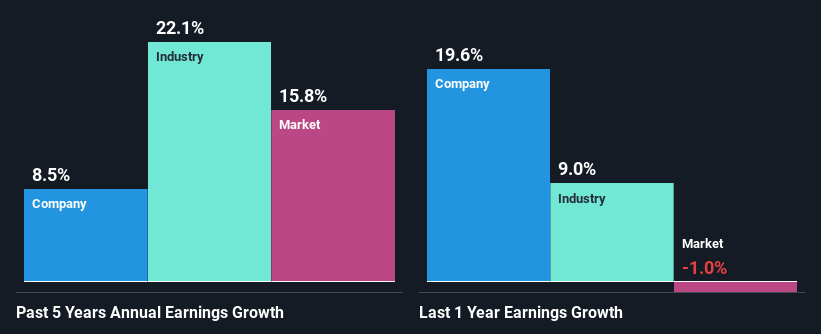Is Altium Limited's (ASX:ALU) Recent Stock Performance Influenced By Its Financials In Any Way?
Altium's (ASX:ALU) stock is up by 7.5% over the past three months. Given that stock prices are usually aligned with a company's financial performance in the long-term, we decided to investigate if the company's decent financials had a hand to play in the recent price move. In this article, we decided to focus on Altium's ROE.
ROE or return on equity is a useful tool to assess how effectively a company can generate returns on the investment it received from its shareholders. In simpler terms, it measures the profitability of a company in relation to shareholder's equity.
View our latest analysis for Altium
How To Calculate Return On Equity?
ROE can be calculated by using the formula:
Return on Equity = Net Profit (from continuing operations) ÷ Shareholders' Equity
So, based on the above formula, the ROE for Altium is:
22% = US$66m ÷ US$304m (Based on the trailing twelve months to June 2023).
The 'return' is the amount earned after tax over the last twelve months. Another way to think of that is that for every A$1 worth of equity, the company was able to earn A$0.22 in profit.
Why Is ROE Important For Earnings Growth?
We have already established that ROE serves as an efficient profit-generating gauge for a company's future earnings. Based on how much of its profits the company chooses to reinvest or "retain", we are then able to evaluate a company's future ability to generate profits. Assuming everything else remains unchanged, the higher the ROE and profit retention, the higher the growth rate of a company compared to companies that don't necessarily bear these characteristics.
Altium's Earnings Growth And 22% ROE
To start with, Altium's ROE looks acceptable. Further, the company's ROE compares quite favorably to the industry average of 9.4%. This certainly adds some context to Altium's decent 8.5% net income growth seen over the past five years.
As a next step, we compared Altium's net income growth with the industry and were disappointed to see that the company's growth is lower than the industry average growth of 22% in the same period.

The basis for attaching value to a company is, to a great extent, tied to its earnings growth. It’s important for an investor to know whether the market has priced in the company's expected earnings growth (or decline). Doing so will help them establish if the stock's future looks promising or ominous. Has the market priced in the future outlook for ALU? You can find out in our latest intrinsic value infographic research report.
Is Altium Making Efficient Use Of Its Profits?
Altium has a significant three-year median payout ratio of 97%, meaning that it is left with only 3.3% to reinvest into its business. This implies that the company has been able to achieve decent earnings growth despite returning most of its profits to shareholders.
Additionally, Altium has paid dividends over a period of at least ten years which means that the company is pretty serious about sharing its profits with shareholders. Existing analyst estimates suggest that the company's future payout ratio is expected to drop to 71% over the next three years. Accordingly, the expected drop in the payout ratio explains the expected increase in the company's ROE to 33%, over the same period.
Conclusion
In total, it does look like Altium has some positive aspects to its business. As noted earlier, its earnings growth has been quite decent, and the high ROE does contribute to that growth. Still, the company invests little to almost none of its profits. This could potentially reduce the odds that the company continues to see the same level of growth in the future. Having said that, looking at the current analyst estimates, we found that the company's earnings are expected to gain momentum. To know more about the company's future earnings growth forecasts take a look at this free report on analyst forecasts for the company to find out more.
Have feedback on this article? Concerned about the content? Get in touch with us directly. Alternatively, email editorial-team (at) simplywallst.com.
This article by Simply Wall St is general in nature. We provide commentary based on historical data and analyst forecasts only using an unbiased methodology and our articles are not intended to be financial advice. It does not constitute a recommendation to buy or sell any stock, and does not take account of your objectives, or your financial situation. We aim to bring you long-term focused analysis driven by fundamental data. Note that our analysis may not factor in the latest price-sensitive company announcements or qualitative material. Simply Wall St has no position in any stocks mentioned.
